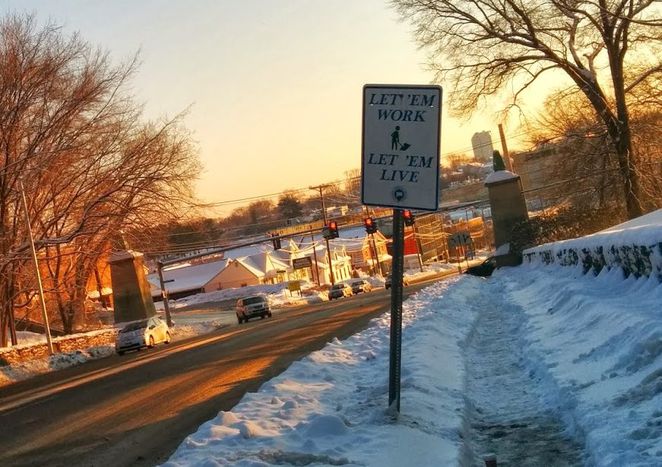
Why the minimum wage hurts the economy
Published on
|Opinion| An American neo-liberal perspective on the minimum wage: Minimum wage laws, though well intentioned, have not improved living standards for low income earners. Worse still, the ill effects of this tampering with the market are hiding in plain sight, yet we still cling to it with arguments that appeal to emotions rather than reason.
“Unexpected item in bagging area” the do-it-yourself checkout machine scolds. A light flashes and a loud beep goes off as I procede with the on-screen instructions. I’m not trying to steal anything ; the machine is just behaving uncooperatively. The complete lack of reaction from the shop assistants and the other customers tells me this wis the norm. Machines like this are the consequence of bad economic policy; let me explain.
Witnessing the poverty and hardship that some individuals suffer just to make ends meet is hard to bear. Our hearts go out to our brothers, but not so often to our wallets. This is what makes some people cry out, “Raise the minimum wage!” Sensing opportunity like a shark smells blood in the water, politicians are quick to take on the task. But when populism trumps reason, it is these very same, vulnerable people who suffer most.
 It seems like a great idea at first. Raise the minimum wage, and all the poorest people get a pay rise overnight. The greedy corporations take a hit to their profit margins and the world becomes a better place. Alas, if only it were so simple. Such reasoning discounts the reality of why anyone has a job at all. Wages are a price; someone’s wage is worked out in the marketplace of supply and demand according to the productivity of the person.
It seems like a great idea at first. Raise the minimum wage, and all the poorest people get a pay rise overnight. The greedy corporations take a hit to their profit margins and the world becomes a better place. Alas, if only it were so simple. Such reasoning discounts the reality of why anyone has a job at all. Wages are a price; someone’s wage is worked out in the marketplace of supply and demand according to the productivity of the person.
By setting a minimum wage, the government is effectively mandating a minimum level of productivity. It is saying that if you can’t do something for which it is worth someone paying you €8 an hour, you must not do anything at all. After all, the only reason anybody ever gives anyone a job is because they want to make money. If the employee costs more than he or she is worth, the employer is going to do something.
One thing the employer will do is pass the costs on to the consumers. Some corporations might be making a lot of money, but margins are always razor thin. There is no way companies can absorb the costs of a mandated wage hike. The resulting price increases leave less money in the hands of consumers. Once again it is the poor who are worse off.
It gets worse. By effectively removing the first rungs on the career ladder, these unfortunate individuals end up never being given the opportunity to learn on the job. Even some high school dropout getting paid next to nothing for filling up your car with petrol and wiping your windscreen is learning a lot of valuable skills. That person is learning to get up early and show up on time. Also, by hanging around the petrol station, he or she might learn enough to become a mechanic. It certainly does them no good to force them to stay home, what would that do to their self-esteem?
Employers will also try and find more ways to reduce the number of people they have to hire. Expensive machines, like the one I was using, become a more attractive investment. Even though the customers might not like it as much, they are preferable to higher prices. Fewer waiters and fewer barstaff means slower service, but as we vote with our wallets and reward the establishments that can give us the best value, employers quickly find they have no choice and make do with less staff. Countless petrol station attendants, bell boys, ushers, fast-food workers and, as the machine in front of me testifies, cashiers, have lost their jobs to the minimum wage law.
the number of people they have to hire. Expensive machines, like the one I was using, become a more attractive investment. Even though the customers might not like it as much, they are preferable to higher prices. Fewer waiters and fewer barstaff means slower service, but as we vote with our wallets and reward the establishments that can give us the best value, employers quickly find they have no choice and make do with less staff. Countless petrol station attendants, bell boys, ushers, fast-food workers and, as the machine in front of me testifies, cashiers, have lost their jobs to the minimum wage law.
Jobs that do not meet the imposed minimum level of productivity still exist is in the black economy, forced underground as they are now illegal. Just like any other measure of price-fixing, the minimum wage leads to shortages and black markets. “But that’s not fair” you might well argue, how is somebody supposed to raise a family on less than €8
an hour? How can they afford to pay the rent? That’s no way to live in dignity. Such hardships are real, but the reality is that forcing fewer people to have a few euros an hour more will not change such hardships, it will only make them worse. Also, why should we assume that every job is for the primary wage earner? What about young unskilled people still living at home, making some extra money for themselves and their family. Should they be expected to raise a family? Is everyone who works expected to afford his or her rent?
A video-tale supporting the minimum wage.
Pointing back to a time of greater hardship, the minimum wage apologists bring up anecdotes of coal miners, dock workers and sweatshops. Such exploitation, though real, was preferable to those workers than the alternatives, which often was a life of agricultural subsistence. Increasing productivity and capital investments lifted the masses out of poverty, wage rates were steadily increasing and sweatshops disappearing long before the minimum wage was introduced. Then what good has this measure accomplished? Politicians can take credit for making exploitation illegal, it sure sounds great, but they are just jumping in front of the parade of economic progress and as a result, they are getting in the way.
Lastly, but perhaps most importantly, there is the freedom aspect. Why should not a man be free to chose for himself if a job is worth his while? Who am I, or anyone for that matter, to get between two people who freely chose to exchange money for labour? Be weary of well intentioned crusaders, populist politicians and unexpected items in bagging areas.



